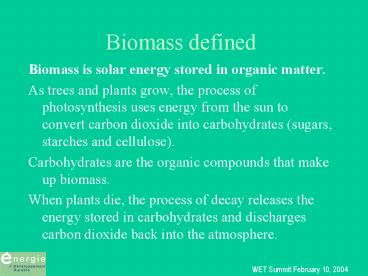Biomass defined PowerPoint PPT Presentation
1 / 25
Title: Biomass defined
1
Biomass defined
- Biomass is solar energy stored in organic matter.
- As trees and plants grow, the process of
photosynthesis uses energy from the sun to
convert carbon dioxide into carbohydrates
(sugars, starches and cellulose). - Carbohydrates are the organic compounds that make
up biomass. - When plants die, the process of decay releases
the energy stored in carbohydrates and discharges
carbon dioxide back into the atmosphere.
WET Summit February 10, 2004
2
Biomass ressources
- Natural occuring (wastes)
- Crops residues
- Livestock residues
- MSW (sometimes questionned)
- manure
- Specifically grown
- Trees
- Energy plants (sweet sorghum, etc.)
WET Summit February 10, 2004
3
Biomass in IEA SD scenario(2000-2050)
- World stable at around 12 of primary energy
- OECD increasing from 5 to 13
- REF increasing from 2 to 8
- ASIA 2000-2040 decreasing from 20 to14
- ASIA 2040-2050 increasing from 14 to 18
- ALM stabilizing at around 17
WET Summit February 10, 2004
4
Present situation
- Biomass used as primary energy source (South)
- Depleting resources
- Inefficient and polluting combustion
- Non sustainable
WET Summit February 10, 2004
5
Future situation
- Biomass can play an important role in rural
electrification - Modern conversion technologies
- Power heat production - CHP
- Low polluting gas emissions
- CO2 neutral balance
WET Summit February 10, 2004
6
Environmental advantages
- Low sulphur content (
- Possibility of a closed mineral and nitrogen
cycle - Decentralised energy if plants are built near
biomass ressources
WET Summit February 10, 2004
7
Some Paths from Biomass to Energy
- Thermochemical processes
- Combustion Pyrolysis (low, medium, high
temperature) - Gasification(air, O2, H20)
- Catalytic Liquefaction (methanol)
- Biochemical processes
- Alcoholic fermentation ethanol
- Anaerobic digestion biogas
- Chemical processes
- organic oils biodiesel
WET Summit February 10, 2004
8
Hydrotreating of bio-oils
WET Summit February 10, 2004
9
Some solutions
- Dedicated crops (trees, perennial grasses)
- Increasing efficiency of existing power plants
(i.e. by upgrading old sugar cane bagasse plants
to modern CHP plants) - MSW degradation to biogas
- Animal manure anaerobic digestion to biogas
WET Summit February 10, 2004
10
Improving sugar mills
- Low-investment
- Rankine Cycle burning bagasse, cane residues,
fuelwood for all-year round power production - High-investment high efficiency
- fluidized bed burners
- Gasification and CC gas and steam turbines
WET Summit February 10, 2004
11
Fuel cells using biogas
- Columbia Bd Phosphoric acid 170 kW FC operating
since 1999 - Kirin Toride Brewery uses molten carbonate 250 kW
FC since April 2003
WET Summit February 10, 2004
12
Stirling engine
- STM Power is going to commercialize a55 kW
Stirling engine that can burn biomass or landfill
gas as a heat source - Stirling engines are good candidates for using
different form of biomass (and other renewables)
WET Summit February 10, 2004
13
Microturbines using biogas
- Small landfill and waste water plants use 15, 30
or 60 kW microturbines for power or CHP - Biogas from anaerobic digester is mainly CH4
- Potential markets Schools, restaurants,
WET Summit February 10, 2004
14
Towards small biomass plants
- Main japanese manufacturers of biomass plants now
aim at small companies and family farms - Hitachi Zosen sells a wood waste biomass plant
treating 300 kg waste/day and producing20 kWe
and hot water for spas - Ebara Corp is claiming the smallest livestock
waste treatment plant
WET Summit February 10, 2004
15
H2 from biomass DOE RD 1
WET Summit February 10, 2004
16
H2 from biomass DOE RD 2
- The goal Producing renewable H2 from
agricultural residue at the same price as present
methane reforming technologies by 2015 - http//www.eere.energy.gov/hydrogenandfuelcells/pd
fs/iib6_evans.pdf
WET Summit February 10, 2004
17
Biomass as the ressource of white biotechnology
- Green biotechnology GMO
- Red biotechnology medecines
- White biotechnology energy and biochemistry
production (integrated biorefineries) - Biofuels as a means for distributed generation
WET Summit February 10, 2004
18
Biogas in China
- 11 million biogas digester
- 1.7 million households new biogas users in 2002
- 2,000 medium size anaerobic digesters for large
livestock farms - Biogas to be daily fuel for 50 millions rural
households in 2010
WET Summit February 10, 2004
19
NEW TAR FREE GASIFIER
WET Summit February 10, 2004
20
New tar-free gasifier 2
- Drying
- Pyrolysis
- Gasification with oriented air stream (1,400
C), avoiding cold spots - Heat recovery
- 4,3 kWh 1 kWhe 2 kWhth 1 kWhloss
WET Summit February 10, 2004
21
New tar-free gasifier 3
WET Summit February 10, 2004
22
ECN (Netherlands) OLGA
WET Summit February 10, 2004
23
Carbo V process
- Process developped by Choren (Germany) producing
tar-free gas from MSW or plants - Carbo V gas can be burned for power
- Carbo V can be used as syngas for further
processing i.e. DaimlerChrysler Biotrol CO2
neutral biodiesel
WET Summit February 10, 2004
24
Prices
- From 500 euros to 4,000 euros /kW
- From 3 cents to 15 cents per kWh
WET Summit February 10, 2004
25
Among Sources
- LAMNET PROJECT WORKSHOPS
- http//www.bioenergy-lamnet.org/
- IEA Renewables for Power Generation
WET Summit February 10, 2004

